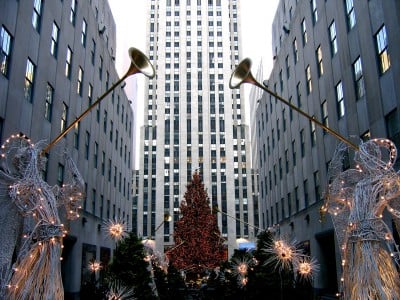New York: Christmas Eve in The City That Never Sleeps?

The city that never sleeps? Well, this Christmas eve New York is defying that moniker.
Although the metropolis may awaken after midnight, it’s presently deserted. Park and Fifth Avenues twinkle on through the evening while their residents abandon streets and highways, malls and markets, parks and bike lanes to join family and friends indoors, even on this warm winter night. Up and down the wide avenues of Manhattan millions of miniature lights still sparkle, embracing tree trunks and reaching through invisible, naked branches. Dazzling decorations that lured shoppers are now but shadows behind dimmed window panes. Curbside parking space is plentiful; taxi drivers have burrowed their cars in suburban garages; fruit vendors, the only merchants in sight, are shuttering their vans.
I pass Symphony Space with its marquee in darkness. Starbucks at 95th is lifeless; although I see lights on atMcDonalds on 96th. Their coffee maker is off; and those employees chatting inside must be waiting to be paid their bonus. (Does McD give Christmas bonuses?). One working mother guarding McD’s door against any new customers unapologetically announces that she’s heading home early today.
Forget any last minute stocking stuffer, a bottle of perfume, chocolates, or wine. Shoppers had their chance; now workers deserve some respite. Do I detect an uncharacteristic respect for workers’ family needs this night? “We’re closed”, whispers a silent Wall Street. For one evening and a day, this mercilessly capitalist center succumbs to ‘tradition’, if not religious conviction.
I don’t remember New York streets as vacant like at 9 pm today. Broadway in lockdown! South Asian cooks in masala bars, Japanese sushi roll wrappers, and Afghan taxi drivers all bend to America’s Christmas (if not Christian) tradition and depart for distant lodgings. No quick pickups from cheap Chinese fast food joints or the Halal shawarma street-carts tonight.
After finishing my radio special after 7 o’clock, I head towards Brooklyn’s Schermerhorn subway station. The streets have emptied. Seeing a handsome brightly lit store selling fresh produce, juices, and organic cereals, I step inside for some bulgar wheat—$8.00. a pound!– but I’m unlikely to find it anywhere else tonight. Four attendants hover in the aisles with no one to serve. (Are they too awaiting their yearend bonus?)
At least the A train to Manhattan is still running and I board a near empty car. Beside me, a groggy fellow, in laborer’s clothes is either drugged or he drank too much at his company party; he teeters beside me all the way out of Brooklyn, then finally stretches himself out over five empty seats as we tunnel towards Manhattan. Three other passengers across from me emit the ambience that identifies ‘tourist’ to any native New Yorker. They’re conversing in French, as are two casually dressed men seated nearby. I spot a young woman an orange hijab browsing through her phone: intense, but not French.
That’s it. What a reversal of mood since I traveled on this very route only 6 hours earlier! Then, subway platforms on the A-Line were not only jammed with commuters; they thrummed with seasonal music proffered by a variety of ‘holiday’ entertainers who know we’re especially generous these days. A cacophony of sound behind me stirs my curiosity and, walking along the platform, I find its source– a man plucking a guitar and stomping his tambourine-wrapped foot while mouthing some unrecognizable tune. Awful. Yet a surprising number of people stop to photograph his pitiful drama. The man’s disharmony is surely a ploy to draw us to his ‘stage’, a presentation as crude as his music and unarguably below NYC’s street-music standards.
There in front of him, and us, five foot-high dolls are perched, each dressed in a colorful bra and skirt. Electrically animated by the man’s vigorous foot slapping, they shake and shimmy, while on a shelf above them, three furry toys– a rabbit, a bear and a monkey– twirl. “Oh look!” squeals a young mother, parking her baby in its stroller. Calling two older children towards the display, the enthusiastically snaps a photo. (Her daughters are less impressed.) Meanwhile passing travelers drop dollar bills into a bowl at the man’s elbow. Others raise their phone cameras towards the makeshift stage, then move on.
I step into the next train to join workers and shoppers heading to Brooklyn. The train car is crowded but four tall men somehow make their way among us, three wearing red Santa caps, followed by one shaking a small brown bag at us. The singers start with “Jingle Bells”, then shift to “Silent Night” in the genre of African American gospel music. I can’t find any singles when I reach into my purse, but the fellow handling the quartet’s ‘donations’ rushes to assist me. Seeing my $10. note, he smiles: “I can give you change”, and reaches into his own sack to help me out. Am I to announce my contribution, divided by four, to the whole train? The carolers, waiting, are into a second verse of Silent Night. An awkward moment. How can I ask for change? So I drop my tenner into the proffered bag forthwith and murmur a blessing to his “Merry Christmas” thankyou.

